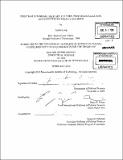First War Syndrome : military culture, professionalization, and counterinsurgency doctrine
Author(s)
Long, Austin G
DownloadFull printable version (26.76Mb)
Other Contributors
Massachusetts Institute of Technology. Dept. of Political Science.
Advisor
Barry R. Posen.
Terms of use
Metadata
Show full item recordAbstract
Counterinsurgency was a persistent and important challenge to military organizations in the second half of the 20th century and seems likely to continue to pose a challenge in the 21st century. This makes understanding how military organizations respond to this challenge both an important policy question and a fruitful area for academic research on military doctrine. The involvement of the United States and the United Kingdom in counterinsurgency in Kenya, South Vietnam, and Iraq are used to test four competing hypotheses on the origin and development of military doctrine. The four hypotheses are doctrine as rational response to environment, doctrine as product of civilian intervention, doctrine as means to deal with generic organizational desires and problems, and doctrine as product of organizational culture. This latter hypothesis is developed extensively by examining the professionalization of military organizations through professional military education, which has its origin in a certain set of experiences termed "the first war." The next three chapters detail the formation and evolution of culture and professional education in three militaries (U.S. Army, U.S. Marine Corps, and British Army). The case studies then test how these organizations responded in terms of doctrine and operations to the challenge of counterinsurgency in South Vietnam (U.S. Army and Marine Corps), Kenya (British Army) and Iraq (all three). It then presents, as an additional plausibility probe, a brief shadow case of Afghanistan and Pakistan (all three organizations, plus the Canadian and Pakistani armies). The evidence in these case studies indicates a strong role for organizational culture in military doctrine and operations when information from the environment is ambiguous (as it frequently is, especially in counterinsurgency) but that culture is substantially attenuated in effect when information from the environment becomes unambiguous. It then concludes by discussing both theoretical and policy implications and avenues for future research.
Description
Thesis (Ph. D.)--Massachusetts Institute of Technology, Dept. of Political Science, 2010. Vita. Cataloged from PDF version of thesis. Includes bibliographical references.
Date issued
2010Department
Massachusetts Institute of Technology. Department of Political SciencePublisher
Massachusetts Institute of Technology
Keywords
Political Science.